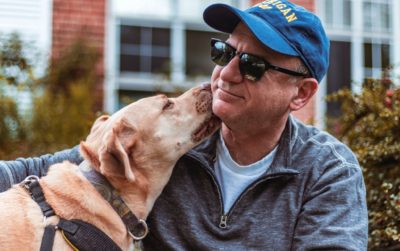 HABIC Animal Trainer and Volunteer Coordinator Kate Miller and Postdoctoral Researcher Kerri Rodriguez collaborated on a study about the short-term effects of a dog training intervention for military veterans with PTSD using the veteran’s own pet dog.
HABIC Animal Trainer and Volunteer Coordinator Kate Miller and Postdoctoral Researcher Kerri Rodriguez collaborated on a study about the short-term effects of a dog training intervention for military veterans with PTSD using the veteran’s own pet dog.
This pilot feasibility study suggests a dog training intervention may clinically reduce PTSD symptoms in veterans. Because pet dogs are significantly easier to acquire than service dogs, training interventions could represent an accessible way for veterans to experience the benefits of dogs.
HABIC is now collaborating with CSU partners to offer this dog training intervention to veterans at the university on a regular basis.
Veterans participated with their pet dogs
The research team stated that post-traumatic stress disorder (PTSD) affects military veterans in the United States at alarming rates. In addition to depression and suicidality, PTSD can cause adverse family outcomes, social isolation, and increased anger.
Although service dogs can have positive impacts on veterans with PTSD, training service dogs is expensive, and waitlists for service dog placements can be years long. Pet dogs are much more accessible and may offer similar benefits as trained service dogs.
Veterans were invited to participate in the study through the Fort Collins Vet Center, a community-based counseling center that offers a variety of free services for Veterans, service members, and their families in a non-medical setting. Inclusion criteria for veterans consisted of a diagnosis of PTSD, enrollment in individual therapy, and owning a dog. Inclusion criteria for dogs consisted of no dog or human-directed aggression, and an animal at least 10 months old.
Participants received a 10-week positive reinforcement dog training intervention with their personally-owned companion dog. The intervention was designed to mirror concepts commonly used in VA therapeutic settings, including building communication, assertiveness, trust, and relationships.
Dog training may be a more accessible human-animal interaction for veterans to decrease PTSD symptoms
On average, veterans tended to view the dog training intervention more positively post-intervention than pre-intervention. Veterans also tended to agree more strongly that they can trust and communicate with their dogs.
This pilot study suggests that a dog training intervention may be associated with decreasing PTSD symptoms in veterans. In addition, veterans reported they found dog training to be less frustrating and intensive than they anticipated. The researchers concluded that dog training interventions could represent an accessible way for veterans to experience the benefits of dogs.
About Human-Animal Bond in Colorado
 Founded in 1993, Human-Animal Bond in Colorado (HABIC) is a center in the School of Social Work, part of CSU’s College of Health and Human Sciences. HABIC’s mission is to improve the quality of life for people of all ages through the therapeutic benefits of companion animals, with particular focus in the areas of community outreach, teaching, and research.
Founded in 1993, Human-Animal Bond in Colorado (HABIC) is a center in the School of Social Work, part of CSU’s College of Health and Human Sciences. HABIC’s mission is to improve the quality of life for people of all ages through the therapeutic benefits of companion animals, with particular focus in the areas of community outreach, teaching, and research.